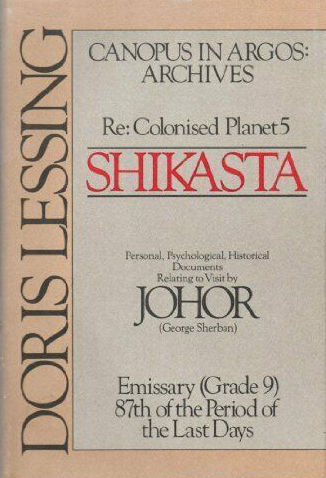
Did Doris Lessing influence David Foster Wallace? The question occurred to me as I read Lessing’s Shikasta, the first in her five-volume Canopus in Argos series of “space fiction” novels. Shikasta is a planet subject to Canopian “supervision”. Canopus is a galactic empire. Their rivals are the Sirians, but the real thorn in their flesh are the Shammat, a nasty bunch from Puttiora, who stir up trouble on Shikasta, and threaten to throw everything out of balance. About a quarter of the way into the novel, we realize that Shikasta is the Canopian name for the planet Earth and much of the evil and insanity which the Shammat have caused is better known to us as the 20th century. In effect, the novel is a clever ruse on Lessing’s part to write critically of global issues affecting the human species—racism, exploitation of other peoples, environmental destruction, militarism.
It reminds me of David Foster Wallace, in particular, Infinite Jest, and for several reasons.
First, is the rejection of realism. In her opening remarks, Lessing observes “that novelists everywhere are breaking the bonds of the realistic novel because what we all see around us becomes daily wilder, more fantastic, incredible.” Wallace seems to have taken her words to heart with his story of the video cartridge which so captivates its viewers that they refuse to look away and simply watch and watch, becoming listless and vegetative.
Second is the play between the epic sweeping macro vision and the fine-grained narrative of momentary detail. While Shikasta sometimes pulls back to matters of interplanetary conflict stretching over thousands of years, there is also an extended section of excerpts from Rachel Sherban’s journal recounting family life in the Sherban household and her puzzlement at her brother George’s odd behaviour. In the same way, Wallace writes about the machinations of terrorist and spy organizations that operate throughout North America, while digressing to relate the development of Hal Incandenza’s serve at the Enfield Tennis Academy.
Third is the elasticity (playfulness?) both exhibit in the way they spin out their sentences.
Here’s the passage (p 296) that triggered my question about influence. It is an excerpt from a communiqué between Benjamin Sherban and his brother George who is, in fact, an emissary from Canopus posing as a human:
…we were being faced with the complete loss of autonomy of the Youth Armies—such as it has been—but we are not expected to mind: on the contrary, we must allow ourselves to be swallowed whole without a protest.
But do not think I carp! Since this is bound to happen, at some point and we all knew it, I, they, everyone, am, are, is, overwhelmed with admiration as usual at the smooth tact of our Chinese Benevolences, such a nice change compared to you-know-who, and what a pity they feel themselves too good to learn useful lessons from our Beneficial Rulers.
Right. So much for the framework, which is not the burden of my information, only the background.
The above-mentioned “informal discussions” went on day and night aided by (moderate) alcohol, (well-tempered) sex, eternal friendships being sworn between Alaskans and Brazilians, South Sea Islanders and Irishmen, lassies from Cape Wrath and denizens of the Cape of Good Hope, everything as usual.
Everything exactly as usual, and as to be expected, all the attitudes being struck that the Benevolences were obviously wanting us to get out of the way before serious discussions could begin: “Never will I bow my head…” “I would die sooner than…” “Do they think they can buy…” etc. and so on ad pukeam. But after a few hours the atmosphere changed, and this is where I rely on your interpretation. Bearing in mind that during this phase our mentors were always discreetly elsewhere, appearing only for meals, charm and friendly likeability personified.
Compare to a randomly selected passage from Infinite Jest (p 548):
EARLY NOVEMBER
YEAR OF THE DEPEND ADULT UNDERGARMENT
The only bona fide blackmailable thing about Rodney Tine, Chief, U.S., Office of Unspecified Services: his special metric ruler. In a locked drawer of his bathroom cabinets at home on Connecticut Ave. NW in the District is kept a special metric ruler, and Tine measures his penis every A.M., like clockwork; has since twelve; still does. Plus a special telescoping travelling model of the ruler he travels with, for on-the-road-A.M.-penis-measurement. President Gentle has no N.S.A. as such. Tine’s in metro Boston because about two summers past, both the head of D.E.A. and the Chair of the Academy of Digital Arts and Sciences, now both here standing on one foot and then the other and twidgelling the brims of their hats. This unwatchable underground Entertainment-cartridge that at first seemed to be just popping haphazardly up in random locales: a film with certain he”s given to understand from briefings quote ”qualities” such that whoever saw it wanted nothing else ever in life but to see it again, and then again, and so on.
Without an explicit statement from the author himself, direct influence can be a tricky thing to gauge. The best we can say is that there is a similarity. Nevertheless, if the influence wasn’t direct, I’m willing to wager, at the very least, that there was a common influence.